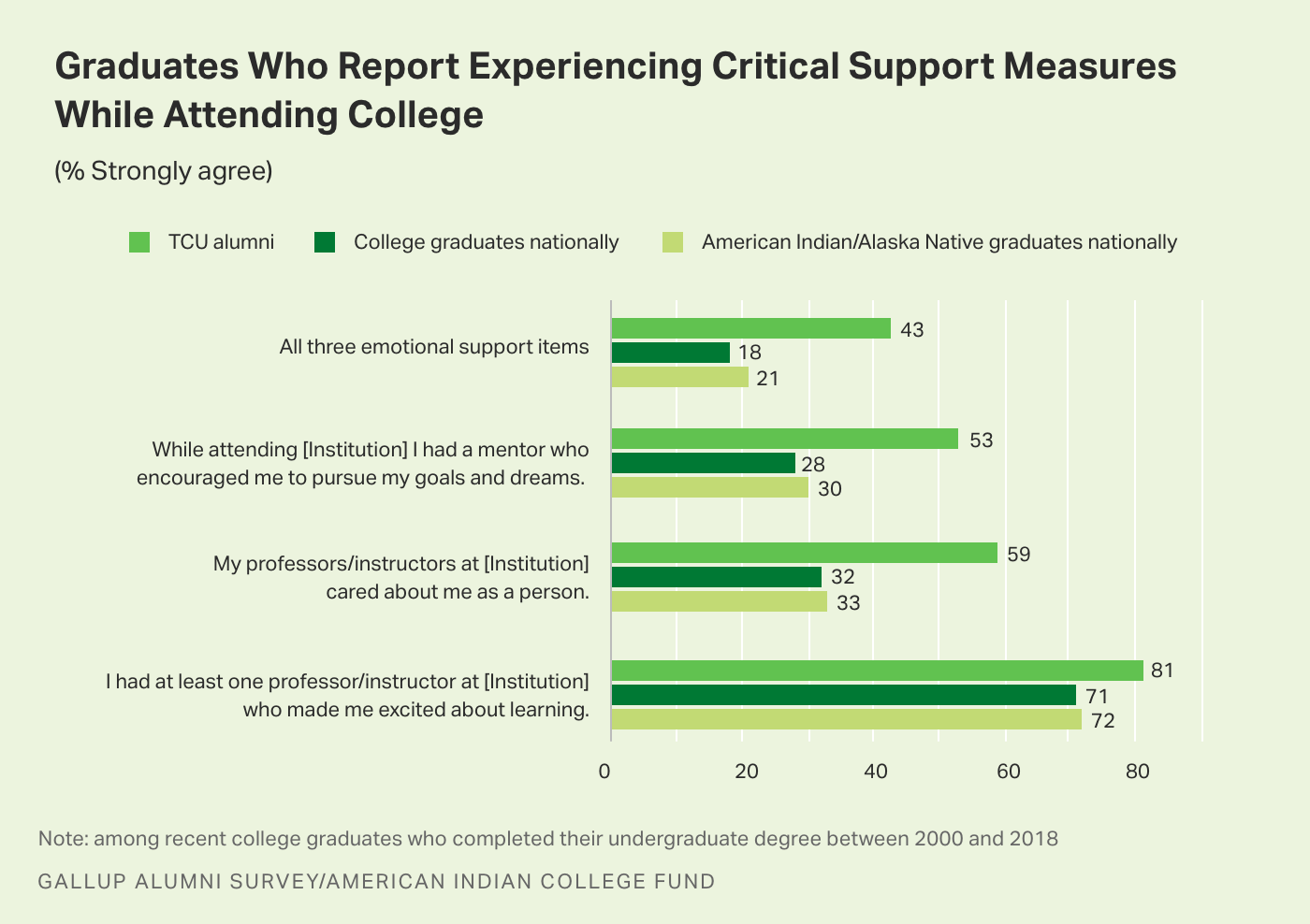A recent Gallup study commissioned by the American Indian College Fund with support from the Strada Education Network demonstrates that graduates of U.S. tribal-run colleges and universities enjoy several positive benefits from their unique college experience.
When compared with benchmarked outcomes from a national sample of degree-holders in the United States, graduates of Tribal Colleges and Universities (TCUs) -- fully accredited two- and four-year higher education institutions -- outpace all other graduates of higher education institutions in being engaged in their work and their communities. Alumni from TCUs are also more likely to feel they were better prepared for life after college, to enjoy high levels of personal wellbeing and to be more emotionally attached to their alma mater.
TCUs are usually tribally controlled, typically located on Indian reservations or in other rural areas and are imbued with a mission to serve American Indian students with instruction that is more aligned with Native culture and values than what mainstream institutions offer. In 2017, over 11% of all American Indian students studying at a U.S. two- or four-year public or private not-for-profit postsecondary institution attended one of the 35 accredited institutions affiliated with the American Indian Higher Education Consortium, the TCU member association.
While culturally and geographically diverse, all TCUs share common goals such as building strong connections to the physical and cultural spaces where they are based; integrating cultural content in curriculum and pedagogy; and emphasizing community outreach and education that is rooted in tribal identity and practice.
Majority of TCU Graduates Received Close Personal Attention at College
Gallup finds that TCU graduates (43%) are more than twice as likely as American Indian/Alaska Native graduates of non-TCUs (21%) to recall experiencing all three critical support measures that Gallup tracks: having a professor who cared about them as a person; having a professor who made them excited about learning; and having a mentor who encouraged them to pursue their goals and dreams. TCU graduates outpace non-TCU American Indian/Alaska Native graduates in all three measures, with the gap between TCU and non-TCU graduates the widest for having professors who cared about them as people (59% vs. 33%, respectively).

Prior Gallup research has found that support and experiential learning opportunities are strongly related to graduates' feelings of preparedness for life outside of college, workplace engagement and personal wellbeing. TCU alumni report better outcomes than both college graduates and American Indian/Alaska Native graduates nationally with respect to their community, social and career wellbeing.
Higher Work Satisfaction Separates TCU Graduates From Others
The close ties between TCUs and the communities surrounding them have created a mutually beneficial relationship. These graduates possess a strong sense of community engagement, have strong relationships in their lives and feel fulfilled in how they occupy their time by liking what they do every day.
Perhaps due to the experiences behind these measures, TCU alumni give back to their communities in remarkable ways. Seventy-four percent report being primarily employed in areas related to American Indian communities or tribal lands, and many work directly with their tribe.
The connection between community and higher education experience has led significant numbers of TCU alumni to report that they:
- strongly agree they are deeply interested in the work that they do
- have a job that gives them the opportunity to do work that interests them
- have the ideal job for them
In fact, TCU graduates outperform all comparison groups by a significant margin on these three measures.
| TCU alumni | College graduates nationally | American Indian/Alaska Native graduates* | |||||||||||||||||||||||||||||||||||||||||||||||||||||||||||||||||||||||||||||||||||||||||||||||||
|---|---|---|---|---|---|---|---|---|---|---|---|---|---|---|---|---|---|---|---|---|---|---|---|---|---|---|---|---|---|---|---|---|---|---|---|---|---|---|---|---|---|---|---|---|---|---|---|---|---|---|---|---|---|---|---|---|---|---|---|---|---|---|---|---|---|---|---|---|---|---|---|---|---|---|---|---|---|---|---|---|---|---|---|---|---|---|---|---|---|---|---|---|---|---|---|---|---|---|---|
| % | % | % | |||||||||||||||||||||||||||||||||||||||||||||||||||||||||||||||||||||||||||||||||||||||||||||||||
| I am deeply interested in the work that I do. | 53 | 38 | 40 | ||||||||||||||||||||||||||||||||||||||||||||||||||||||||||||||||||||||||||||||||||||||||||||||||
| My job gives me the opportunity to do work that interests me. | 50 | 37 | 41 | ||||||||||||||||||||||||||||||||||||||||||||||||||||||||||||||||||||||||||||||||||||||||||||||||
| I have the ideal job for me. | 37 | 22 | 27 | ||||||||||||||||||||||||||||||||||||||||||||||||||||||||||||||||||||||||||||||||||||||||||||||||
| * Among American Indian/Alaska Native graduates nationally; all results are among recent college graduates who completed their undergraduate degree between 2000 and 2018 | |||||||||||||||||||||||||||||||||||||||||||||||||||||||||||||||||||||||||||||||||||||||||||||||||||
| Gallup Alumni Survey/American Indian College Fund | |||||||||||||||||||||||||||||||||||||||||||||||||||||||||||||||||||||||||||||||||||||||||||||||||||
TCU graduates have profoundly different experiences from those of American Indian/Alaska Native non-TCU graduates that may translate to vastly different lives outside of college. Remarking on such outcomes, Cheryl Crazy Bull, President and CEO of the American Indian College Fund, commented, "All of us who have worked with tribal colleges and universities since their founding in 1968 recognized that these place-based, culturally-rooted institutions transformed lives and communities. Through the support of Strada Education Network and a partnership with Gallup, we are able to provide the data to back this up."
TCUs appear to have found a model that fits their mission -- addressing the need for tribal students to be prepared for work after college while being personally supported in a culturally affirming environment. Speaking to this impact, President Crazy Bull added, "Our graduates tell the story of our success as tribal institutions."




